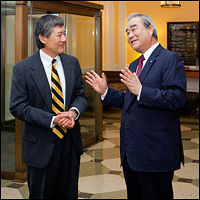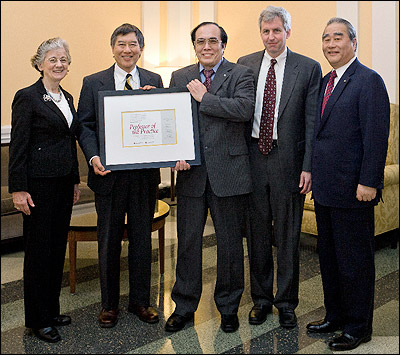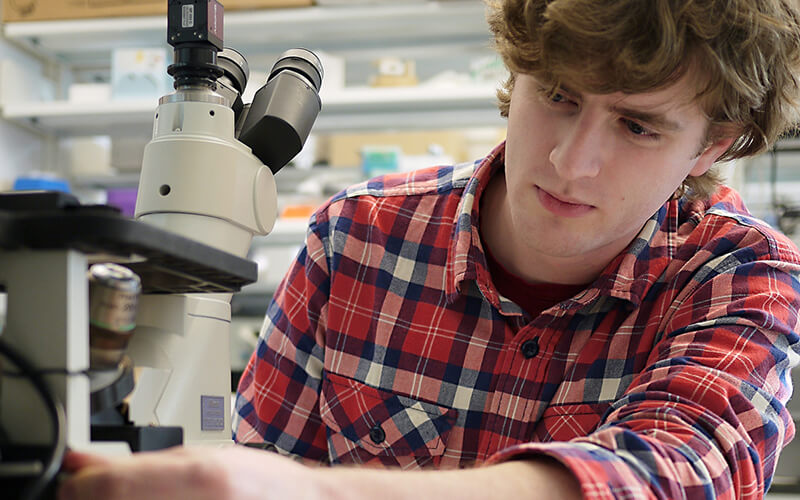 In 2011, Canon U.S. Life Sciences, Inc. (a subsidiary of Canon U.S.A., Inc.) and the Fischell Department of Bioengineering at the A. James Clark School of Engineering, University of Maryland launched a new research collaboration to develop a highly automated system providing rapid infectious disease diagnosis. Utilizing Canon U.S. Life Sciences' proprietary genetic analysis system, the project aims to expedite the delivery of infectious disease test results while also simplifying the test process to allow a variety of clinical staff to perform automated disease diagnosis.
In 2011, Canon U.S. Life Sciences, Inc. (a subsidiary of Canon U.S.A., Inc.) and the Fischell Department of Bioengineering at the A. James Clark School of Engineering, University of Maryland launched a new research collaboration to develop a highly automated system providing rapid infectious disease diagnosis. Utilizing Canon U.S. Life Sciences' proprietary genetic analysis system, the project aims to expedite the delivery of infectious disease test results while also simplifying the test process to allow a variety of clinical staff to perform automated disease diagnosis.
The research team is led by Hiroshi Inoue, senior fellow, Canon U.S. Life Sciences, and Professor William E. Bentley, chair of the Fischell Department of Bioengineering in the university's A. James Clark School of Engineering. Together with their co-researchers, BioE professors Keith Herold and Ian White, they will pioneer the use of microfluidic chip technology in disposable testing cartridges containing human blood samples.
Using Canon U.S. Life Sciences' genetic analysis technology, the high-throughput cartridge system will identify bacterial pathogens in human blood by using genetic matching technology, thereby cutting the length of time required to test a sample from several days to one hour.
"The establishment of our relationship with Canon U.S. Life Sciences represents a major industrial collaboration for the University, the Clark School, and the Fischell Department of Bioengineering," said Bentley. "Leveraging our combined research capabilities will advance both Canon U.S. Life Sciences' commercial portfolio and the university's mission to create innovative knowledge and educational opportunities for its students."
Hiroshi Inoue, Professor of the Practice

The Fischell Department of Bioengineering and the A. James Clark School of Engineering are pleased to welcome Hiroshi Inoue to its faculty as a Professor of the Practice.
"I am honored and humbled by my appointment at University of Maryland as Professor of the Practice," says Inoue. "I expect that it will provide a powerful linkage between the Global Canon Group and the University of Maryland. We already have an exciting collaboration with the Fischell Department of Bioengineering and I look forward to an ongoing relationship."
During his nearly 35-year career, Inoue, a graduate of the Engineering Science School at Osaka University, Japan, has pioneered numerous and diverse technologies while working for some of the world's most prominent companies, including Seiko, Epson, Ricoh, and, since 1983, Canon. These include the development, market introduction and market expansion of novel flat-panel displays; the introduction of the ISO/IEC Standard into the MPEG-4 file format, which enables users to view video on smartphones; and genetic diagnostics systems. In 2004, he founded and served as the first president and Chief Technology Officer of Canon U.S. Life Sciences, Inc., which is dedicated to the development of diagnostic instrumentation based on Canon's core technologies. In 2010 he was appointed Senior Fellow of Canon U.S.A. and Canon U.S. Life Sciences. Inoue holds almost 350 patents in Japan and the United States.
Inuoe's goal is to provide doctors and clinics with sophisticated molecular analysis tools capable of providing "bedside diagnostics" that can be performed by any trained hospital or clinic staffmembers and that will eliminate the need to wait for lab results.
 At a ceremony celebrating the Fischell Department of Bioengineering's new partnership with Canon U.S. Life Sciences (CUSLS), CUSLS founder and senior fellow Hiroshi Inoue was inducted into the faculty as a Professor of the Practice. Left to right: past National Science Foundation director, National Academy of Sciences member, and Distinguished University Professor Rita Colwell; University of Maryland president Wallace Loh; Hiroshi Inoue; BioE Professor and Chair William E. Bentley; and Canon U.S.A. president and CEO Yoroku Adachi. Photo by John T. Consoli.
At a ceremony celebrating the Fischell Department of Bioengineering's new partnership with Canon U.S. Life Sciences (CUSLS), CUSLS founder and senior fellow Hiroshi Inoue was inducted into the faculty as a Professor of the Practice. Left to right: past National Science Foundation director, National Academy of Sciences member, and Distinguished University Professor Rita Colwell; University of Maryland president Wallace Loh; Hiroshi Inoue; BioE Professor and Chair William E. Bentley; and Canon U.S.A. president and CEO Yoroku Adachi. Photo by John T. Consoli.
In 2011, the University of Maryland created a new
Center of Excellence in Regulatory Science and Innovation (CERSI), funded by an initial $1 million grant from the U.S. Food and Drug Administration. The center will focus on modernizing and improving the ways drugs and medical devices are reviewed and evaluated.
The new center is a collaborative partnership between the University of Maryland, College Park, and the University of Maryland, Baltimore. Researchers from both campuses will work with FDA scientists to develop new tools, standards and approaches to assess the safety, efficacy, quality and performance of FDA-regulated products.
"Maryland's CERSI will draw from University of Maryland expertise on both the College Park and Baltimore campuses and create new mechanisms for scientific exchange, education and training, and regulatory science research," said Fischell Department of Bioengineering professor and founding chair William E. Bentley. Bentley and James Polli, the Shangraw/Noxell Endowed Chair in Pharmaceutical Sciences at the University of Maryland School of Pharmacy, are co-principal investigators on the initiative.
"Collectively, FDA, industry, and academic scientists all recognize the need for new tools in drug discovery and development, such as a series of new laboratory tests or software, in order to anticipate safety and efficacy of drugs in development," says Polli.
Center researchers will assist the FDA in driving innovation in medical product development, as well as in advancing laboratory, population, behavioral and manufacturing sciences.
"These partnerships represent a critical, necessary and creative investment—one that will benefit not just FDA and academia, but also American consumers and industry," says FDA Chief Scientist Jesse L. Goodman. "The Centers of Excellence will create new scientific research, training and staff exchange opportunities for FDA and leading area institutions."
The University of Maryland center will focus on three key FDA priorities:
-
improving pre-clinical assessments of the safety and efficacy of new drugs and devices;
-
ensuring readiness to evaluate innovative and emerging technologies; and
-
harnessing diverse data through information sciences to improve health outcomes.
Maryland researchers will address pre-clinical assessment challenges related to membrane transporters in drug development, hepatotoxicity biomarkers and personalized medicine, as well as device evaluation related to optical imaging, materials such as nanostructured polymeric coatings for stents and grafts, and tissue engineering.
The new UMD/UMB center also will sponsor seminars and workshops, as well as an open public forum to promote regulatory science exchange, bringing together a network of experts from academia, industrial consortia and FDA scientists.
"This innovative new center will improve the lives of Americans," says Patrick O'Shea, vice president for research at the University of Maryland, College Park. "University of Maryland's researchers will help the FDA transform the way that drugs and devices are evaluated and influence how they are designed, developed, manufactured and brought to market."
The FDA also awarded $1 million to Georgetown University for a sister regulatory science and innovation center. According to the FDA, the agency chose to pilot the two centers in the Washington, D.C., area to allow for the greatest possible face-to-face collaboration and training with FDA staff.
To learn more about CERSI personnel, research and events, please visit
cersi.umd.edu.
 In 2011, Canon U.S. Life Sciences, Inc. (a subsidiary of Canon U.S.A., Inc.) and the Fischell Department of Bioengineering at the A. James Clark School of Engineering, University of Maryland launched a new research collaboration to develop a highly automated system providing rapid infectious disease diagnosis. Utilizing Canon U.S. Life Sciences' proprietary genetic analysis system, the project aims to expedite the delivery of infectious disease test results while also simplifying the test process to allow a variety of clinical staff to perform automated disease diagnosis.
In 2011, Canon U.S. Life Sciences, Inc. (a subsidiary of Canon U.S.A., Inc.) and the Fischell Department of Bioengineering at the A. James Clark School of Engineering, University of Maryland launched a new research collaboration to develop a highly automated system providing rapid infectious disease diagnosis. Utilizing Canon U.S. Life Sciences' proprietary genetic analysis system, the project aims to expedite the delivery of infectious disease test results while also simplifying the test process to allow a variety of clinical staff to perform automated disease diagnosis. The Fischell Department of Bioengineering and the A. James Clark School of Engineering are pleased to welcome Hiroshi Inoue to its faculty as a Professor of the Practice.
The Fischell Department of Bioengineering and the A. James Clark School of Engineering are pleased to welcome Hiroshi Inoue to its faculty as a Professor of the Practice. At a ceremony celebrating the Fischell Department of Bioengineering's new partnership with Canon U.S. Life Sciences (CUSLS), CUSLS founder and senior fellow Hiroshi Inoue was inducted into the faculty as a Professor of the Practice. Left to right: past National Science Foundation director, National Academy of Sciences member, and Distinguished University Professor Rita Colwell; University of Maryland president Wallace Loh; Hiroshi Inoue; BioE Professor and Chair William E. Bentley; and Canon U.S.A. president and CEO Yoroku Adachi. Photo by John T. Consoli.
At a ceremony celebrating the Fischell Department of Bioengineering's new partnership with Canon U.S. Life Sciences (CUSLS), CUSLS founder and senior fellow Hiroshi Inoue was inducted into the faculty as a Professor of the Practice. Left to right: past National Science Foundation director, National Academy of Sciences member, and Distinguished University Professor Rita Colwell; University of Maryland president Wallace Loh; Hiroshi Inoue; BioE Professor and Chair William E. Bentley; and Canon U.S.A. president and CEO Yoroku Adachi. Photo by John T. Consoli.
